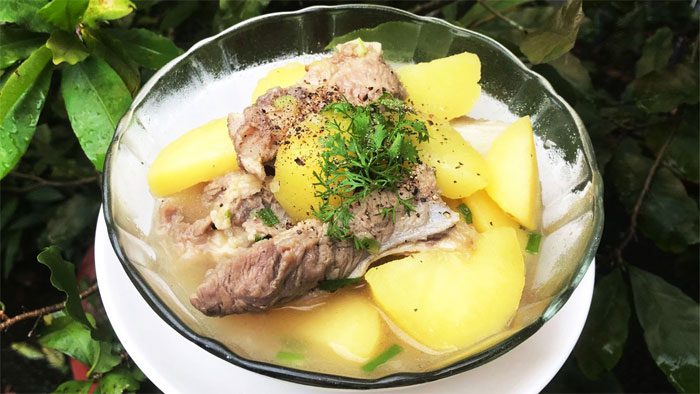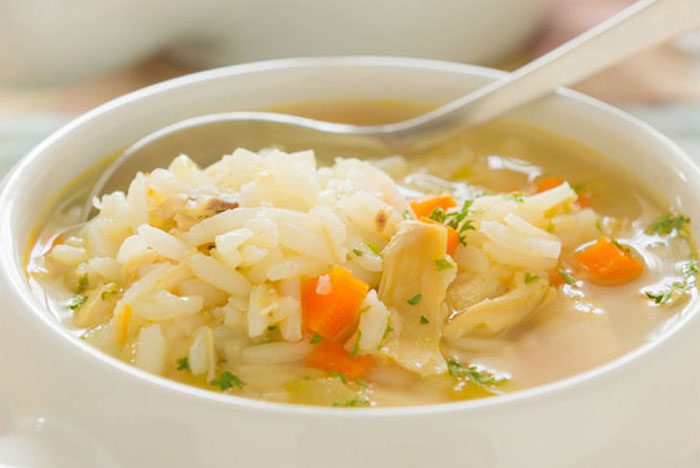Soup is a familiar dish, even an essential part of many family meals. However, few people care about how to properly and healthily consume soup.
Soups come with a wide range of ingredients and food combinations during preparation. In many places, the term soup is used to refer to any dish with liquid, whether it is thinly cooked with vegetables or thick like a stew with meat.
For many, a meal feels incomplete and less delicious without soup. This is because a bowl of soup not only provides hydration, making it easier to chew and digest but also serves as a nourishing dish filled with nutrients. In summer, soups can cool the body, while in winter, hot soups can warm you up.
However, eating soup correctly is essential to ensure it is both delicious and nutritious while being good for your health. At the very least, avoid the following four mistakes that can harm your health and increase your risk of cancer:
1. Eating Too Quickly or Consuming Excessive Amounts of Soup
The fast pace of life has led many people to develop a habit of eating quickly and swallowing hastily. However, this is a bad habit. The longer you take to enjoy your meal, the more you can savor the delicious flavors of the dish. The same goes for soup; when you eat slowly, your body has enough time to digest and absorb the nutrients. Feeling full indicates that you have reached a proper amount.
Conversely, eating too quickly, especially when soup is easy to consume due to its liquid nature or nutrient-rich when simmered with meat or fish, can lead to overeating. By the time you feel full, you may have ingested an excessive amount of soup, causing discomfort and affecting your weight. Over time, this can lead to obesity and an increased risk of disease.
Eating soup too quickly also poses a risk of choking on bones or vegetables present in the soup. If you want to truly enjoy the flavor of soup and avoid unnecessary risks, eat it slowly, using a spoon and observing it carefully before bringing it to your mouth.
Additionally, if the soup is high in salt, calories, or purines, you should avoid consuming too much in one sitting to prevent obesity and health risks. It is advisable to limit yourself to about 2 to 4 bowls of soup maximum per meal; if you drink more soup, consider reducing the portions of rice and other dishes.
2. Eating Soup That Is Too Hot
Many people have the habit of eating soup right after cooking, meaning it is still very hot, especially in winter. However, this habit can cause significant harm to the esophagus and stomach and carries a risk of burns to the mouth.

Eating soup that is too hot, especially over 60 degrees Celsius, increases the risk of cancer. (Illustrative image).
This is because the esophagus can only withstand temperatures of about 50 – 60 degrees Celsius at most. When reaching this level, both the esophagus and stomach feel uncomfortable, and exceeding this threshold can lead to burns and damage. Repeated damage without adequate healing can lead to inflammation and even cancer.
According to the World Health Organization (WHO), consuming food that is too hot at over 60 degrees Celsius can increase the risk of esophageal cancer, stomach cancer, pharyngeal cancer, and oral cancer. Therefore, it is best to let soup cool down a bit before eating for safety!
3. Eating Rice with Soup
Many people might be surprised to learn that eating rice with soup can also be harmful to health. Experts consider this a bad habit that can damage the stomach, making it easier to gain weight, choke, and causing indigestion.
When chewing food, enzymes in saliva are secreted to aid the digestion and absorption of food, which is very beneficial for health. Eating rice while pouring soup over it causes the rice to lose its protein content, reducing the nutritional value of the rice.
Pouring soup over rice pushes the food down to the stomach too quickly. When food is not properly chewed, the digestive system has to work harder to process it, which can harm the stomach. Additionally, eating rice with soup dilutes digestive juices, causing the body to absorb fewer nutrients from the food.
Over time, this habit can lead to a lazy digestive system, with the stomach and intestines producing fewer juices for contractions. This can result in digestive issues such as stomach pain, duodenal ulcers, and digestive disorders.

Eating rice with soup also increases the risk of choking or swallowing foreign objects due to eating quickly or failing to detect hard food particles. This can lead to damage, inflammation, and difficulties in digestion. Furthermore, eating rice with soup can increase the risk of weight gain and obesity due to the ease of increasing food intake.
4. Many People Eating from the Same Bowl of Soup
One reason soup has become an indispensable dish in family meals is the bonding experience it creates while eating. Many families have the habit of serving a large bowl of soup, then using their own spoons or chopsticks to eat from it throughout the meal.
However, this behavior can increase the risk of spreading certain diseases, the most common being Helicobacter pylori (HP) bacteria. This is a primary cause of stomach and duodenal ulcers. Normally harmless, if someone with a history of stomach pain contracts this bacteria, it can exacerbate their condition and potentially lead to stomach cancer over time. Since this bacteria spreads through saliva, eating from the same bowl or dipping shared utensils can easily transmit it among family members.
Therefore, everyone should eat their own soup, ideally using a separate ladle to serve soup into their own bowl before eating. Similarly, avoid sharing chopsticks or spoons or serving food to one another to minimize health risks.
Experts also recommend drinking soup first before eating rice or consuming it after finishing the meal. Don’t just eat the solids and leave the broth, as this wastes valuable nutrients, especially in soups that have been simmered for a long time.




















































